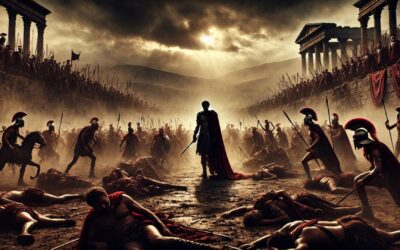It was in the wake of the setting sun that the Athenian soldiers, gaunt and wearied, beheld the fruits of their victory at the Battle of Marathon. They were victors in the eyes of the world, yet within, an insidious sorrow clung to their souls, as unyielding as the shadows cast by the dying light of the day.
The herald Pheidippides had run from Marathon to Athens, a journey of some 26 miles, his voice a clarion call echoing the victory of the Greeks over the Persians. “We have won,” he declared, and with those words, breathed his last. But what is victory, when the herald of triumph lays lifeless, a testament to the unsparing cruelty of war?
In the annals of history, the Battle of Marathon is often told as a tale of the underdog’s triumph. A small Greek force, primarily Athenians, stood valiant against the formidable Persian army, showcasing the indomitable spirit of human resilience and tactical ingenuity. Yet beneath this narrative of valor and triumph, lies a somber testament of the catastrophic toll of war.
Ten thousand Athenian soldiers, their shields gleaming under the Athenian sun, marched towards destiny on that fateful day in 490 BC. Before them lay an enemy, vast and formidable, yet within their hearts, courage surged like the mighty waves of the Aegean. They were sons, fathers, brothers – bound together not by the thirst for glory, but by an unwavering allegiance to their beloved city-state.
As the clarion call of battle resounded through the plains of Marathon, the air, thick with the iron tang of impending conflict, bore witness to the descent of men into the abyss of warfare. With every advance, lives were reaped, as the Grim Reaper danced amidst the clashing of swords and the tumultuous roars of men locked in combat.
Victory was won, but at what cost? A thousand Greek souls lay strewn upon the battlefield, their life’s breath extinguished, their dreams unfulfilled – sons who would never return to the warm embrace of their mothers, fathers who would never again look upon the hopeful eyes of their children.
For the survivors, though they were hailed as heroes, the haunting spectres of war lingered. Every cheer of triumph was a piercing reminder of the fallen, every accolade a heavy chain that bound them to the harrowing memories of the battlefield. The spoils of war were ashes in their mouths, for they had glimpsed the macabre theatre of human destruction.
The Battle of Marathon was not a tale of glory, but a somber narrative of the devastating human cost of conflict. Each spear thrust and sword slash was a chilling epitaph to the dreams of youth, the hopes of families, and the potential of lives unfulfilled. In this narrative of victory, the seeds of profound loss were sown.
The resounding message of Marathon is not one of triumph, but a haunting reminder of the unforgiving shadow of war. A victory hailed in the annals of history, yet borne upon the scarred souls of those who witnessed the unspeakable horrors of conflict. A bitter testament that in the theater of war, even in victory, the haunting spectres of loss lurk ominously, rendering every triumph a solemn dirge of the immeasurable cost of human life.
As the centuries have unfolded, the shadow of Marathon lingers, a chilling cautionary tale echoing the imperious necessity for peace. For in the reflection of every gleaming sword, in the echo of every triumphant roar, the silent whispers of the fallen resonate – a haunting symphony of lives lost, dreams unfulfilled, and the profound sorrow that is the inescapable legacy of war.
It is in the haunting echoes of Marathon that we are reminded – war is not the path to glory, but a journey into the abyss, where victory is a mirage, and the spoils of triumph, ashes in our hands. In the silent vigil of remembrance, amidst the graves of the fallen, the clarion call for peace resounds, echoing the unutterable truth – in the shadow of war, even in victory, the soul is vanquished, and the taste of triumph, ever bitter.
Keywords
- Battle of Marathon: A military confrontation in 490 BC where a smaller Greek force defeated a much larger Persian army. It is noted for the heroic stand of the Greeks and the harrowing human costs of victory.
- Pheidippides: The herald who ran from Marathon to Athens to announce the Greek victory over the Persians, only to die after delivering his message.
- Victory: The achievement of mastery or success in a struggle or endeavor against odds or difficulties. In this context, it’s the Greek win, but one that is questioned due to the significant human loss.
- Sorrow: A feeling of deep distress caused by loss. Despite their victory, the Athenian soldiers and their city were engulfed in sorrow because of the lives lost.
- Human Cost: Refers to the loss of lives, the psychological and emotional trauma experienced by soldiers and civilians during and after a war.
- Aegean: The sea that is located between the mainland of Greece and Turkey, associated here as a symbol of Greek identity and the theater of conflict.
- Clarion Call: A strongly expressed demand or request for action, here used metaphorically to describe the call to arms or the announcement of victory.
- Grim Reaper: A common personification of death, used in the article to depict the death and destruction brought by war.
- Spectres of War: The haunting memories and traumas that linger with survivors long after the conflict has ended.
- Peace: A state of tranquility or quiet, but in the context of the article, it’s the absence of war and conflict, and the ultimate goal for humanity.
Key Takeaways
- The Battle of Marathon, though a victory for the Greeks, brought profound sorrow because of the immense loss of human life.
- The herald Pheidippides’ death after announcing the victory underscores the tragic nature of war.
- The human cost of conflict is a theme, highlighting the loss, trauma, and unfulfilled potentials of the fallen.
- The survivors, hailed as heroes, were haunted by the memories of battle and the lives lost.
- The narrative challenges the traditional glorification of war, underscoring the inherent loss and devastation.
- The article emphasizes the necessity for peace, given the haunting and immeasurable cost of war.
Frequently Asked Questions (FAQs)
How did the Greeks manage to win against a larger Persian army at Marathon?
The Greeks utilized superior tactics, the phalanx formation, and the terrain to their advantage, compensating for their numerical disadvantage. The soldiers’ bravery and unity also played a pivotal role in their unexpected victory.
What was the immediate impact of the Battle of Marathon on Greece and Persia?
For Greece, particularly Athens, the victory boosted morale and national pride. For Persia, it was a blow to their military esteem but served as a catalyst for subsequent invasions, leading to a prolonged conflict between the two civilizations.
Were there any notable figures who fought in the Battle of Marathon?
Miltiades the Younger was a key figure for the Greeks, as his leadership and tactics were crucial in securing victory. On the Persian side, Datis and Artaphernes led the invasion force.
How did the Battle of Marathon influence subsequent Greek and Persian relations?
The battle intensified the animosity between the two civilizations, leading to subsequent invasions and wars, including the famous battles of Thermopylae and Plataea.
What role did the city-states other than Athens play during the Battle of Marathon?
Plataea, a small Greek city-state, supported Athens during the battle. The majority of the fighting force was Athenian, but the Plataean support was significant in boosting the numbers and morale.
How is the Battle of Marathon remembered in modern Greece today?
The battle is remembered as a significant victory, showcased in historical texts, monuments, and annual commemorations. The modern marathon race originated from Pheidippides’ run from Marathon to Athens.
How did the Persian Empire respond to the loss at Marathon?
The loss was avenged during the second Persian invasion of Greece led by Xerxes, resulting in initial successes like the Battle of Thermopylae, though eventually, Persia faced defeat again.
What weaponry and tactics were employed during the Battle of Marathon?
Greeks used the phalanx formation, hoplite shields, spears, and swords. The Persians, with archers, infantry, and cavalry, were ill-prepared for the Greeks’ close-combat expertise.
Did the Battle of Marathon have any significant impact on military strategy in history?
The battle is often cited as an early example of the effective use of tactics and terrain to defeat a numerically superior enemy, influencing subsequent military strategies.
What lessons can contemporary societies learn from the sorrow overshadowing the victory at Marathon?
The profound human cost and the lingering sorrow remind us of the devastating impacts of war, underscoring the importance of diplomatic resolutions and peace-building efforts.
Myth Buster
Myth: The Battle of Marathon was an outright glorious victory for the Greeks.
Reality: While it was a military victory, the loss of life and ensuing sorrow casts a shadow over the triumph. It reminds us that in war, even victory comes at a devastating human cost.
Myth: Pheidippides’ run is celebrated as a moment of pure triumph.
Reality: His death underscores the tragedy intertwined with war – even in moments of victory, there’s an inescapable element of loss and sorrow.
Myth: Ancient battles were about honor and glory, devoid of the traumatic impacts of modern warfare.
Reality: The psychological and emotional scars were as profound then as they are now. War always extracts a severe human toll, irrespective of the era.
Myth: Victors in war emerge unscathed and stronger.
Reality: The victors, though celebrated, often bear unseen wounds, traumas, and the haunting memories of the horrors witnessed and comrades lost.
Myth: The fallen in war are the only ones who pay the price.
Reality: The survivors, families, and entire nations bear the burden of loss, the ripple effects of which can last generations.
Myth: The Battle of Marathon showcased human resilience and triumph alone.
Reality: While resilience was evident, the overshadowing narrative is the harrowing human cost and the imperious necessity for peace.
Myth: Ancient warfare was less devastating than today’s conflicts.
Reality: The devastation, loss, and trauma were profound, underscoring the timeless and universal impacts of war on the human soul.
Myth: The valor of soldiers is best displayed in victory.
Reality: While bravery is celebrated, the article illuminates the price paid for such valor – a price that questions the very essence of war.
Myth: History remembers only the victors and their glory.
Reality: The lingering sorrow and loss, though less chronicled, is an inseparable part of the narrative, reminding us of the devastating impacts of war.
Myth: The physical battleground is the only theater of war’s devastation.
Reality: The psychological, emotional, and societal landscapes are equally marred, bearing scars that outlive the physical aftermath of battle.












0 Comments